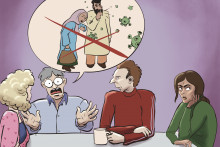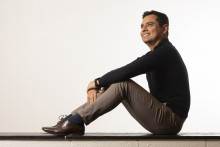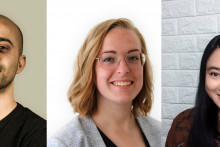Rupsa Basu, originally from India, is a PhD researcher at the UT’s Mathematics of Operations Research group. She has reached out to U-Today because she wanted to raise awareness about exclusion of international PhDs that she has experienced and witnessed at the university. Although her story is unique, it doesn’t stand alone. Both P-NUT (PhD Network of the University of Twente) and the UT’s Ombuds Officer confirm that Rupsa’s experiences are similar to those of other doctoral candidates.
Problematic remarks
‘I have encountered so many problematic situations at the UT that I don’t even know where to begin. Let’s start with my first day in the office. I arrived here during the pandemic, and so it wasn’t until November 2020 that I started coming to the campus. Almost as soon as I arrived, a colleague commented that they were annoyed, because “foreigners were flooding Dutch hospitals, therefore taking up all the space for others”. Once the person realized that I was there, they tried to correct themselves and said “I meant Turkish people”. That didn’t improve the situation for me. The fact that such a statement could be so boldly stated without reason is extremely problematic.
Another example that comes to mind happened during a coffee break with coworkers. While sitting with a group at a table, somebody made a comment about Muslims. The person said something along the lines of “I don’t like that there are so many Muslims in the Netherlands”. This is problematic in any situation, but especially if you are sitting together with a bunch of internationals who might or might not be Muslims.
A few months later, I went to India to visit my family and I got COVID-19 during my visit. A friend, who also happened to go to India around the same time, returned home with COVID-19. We were discussing this at work, as people do. As a response, one of my colleagues said “India seems to be THE place to get COVID.” I found that very inappropriate, because everyone was getting sick everywhere at that point! You can ignore these comments once or twice, or even ten times, but at certain point it’s just too much.
I have experienced and witnessed many remarks like that. If I really think about it, they happen nearly every single day. Remarks about certain nationalities or cultures. If we – as internationals – confront these remarks, - which is something that I often do - we are often told that Dutch people are simply direct. But there is a thin line between being direct and being rude.
‘Incidents like this make my work very unproductive’
Incidents like this make my work very unproductive. It is very fatiguing to confront these issues all the time as it takes up a lot of mental space. I am extremely unsatisfied with such a work environment which makes it difficult for me to focus on my job and where I am not able to realise my full potential. My goal is to be a good mathematician, but these situations do not allow me to learn well enough. And I know from personal experiences that others have these problems too. The impact on the research output of all these PhDs is immeasurable.’
Han Warmelink, Ombuds Officer at the UT: ‘More empathy is needed’
‘This story is recognizable to me. Every year I receive about forty reports; and four to five are related to cultural differences – and most of those are filed by international PhDs. I have received complaints about situations when people felt discriminated and most of them come from external PhDs from outside the EU.
The issue is very complicated. The UT of course wants to treat everyone equally, but the situation of international PhDs is often very different. They come here and they find themselves in a difficult situation: they don’t know the language, they need to find housing, apply for a visa, they need to pay a lot of money, they don’t know anyone. The big question is: who should support them? Is it their supervisors, is it HR, is it some other UT department?
It seems that the UT doesn’t fully understand their situation. More empathy is needed. We need to try to understand what it’s like to come to an environment that you don’t know at all and that is very different from your own background. It’s all about expectations and expectations management. When PhDs come here from abroad, their expectations should be properly managed. Internationals don’t want to complain, but they need the right expectations of what it’s really like to work here.
The problems of international PhDs are known to me, but I don’t have the solution. I also don’t want to assign any blame. Everyone is doing their best, but it’s just a very difficult situation. I think the UT also does its best, but there could be more empathy and more understanding for one another.’
Refused medical treatment
‘The conversation with U-Today and the decision to speak up publicly was triggered by my recent experience with a Dutch doctor. He not only delayed but also refused treatment. I went to the doctor because I was in an enormous amount of pain. There were days I couldn’t walk. But my symptoms were downplayed or represented as not important for a long time. After bearing the pain for several months, I had sufficient reason to suspect that a medical test of the painful area was essential. He not only refused to do that but also yelled at me that I, as a foreigner, am demanding expensive treatment. He screamed that I don’t understand how things worked in the Netherlands. It was very distressing for me. In the end, I decided to go to a doctor in Germany and pay for everything myself. I got the required tests and a large tumor in the affected area was found. I recently had a surgery abroad. Luckily, the tumor was benign but had I waited for a longer period, as suggested by the doctor, it could have had consequences on my ability to have children. The whole situation was tragic for me and it was the main reason why I decided to speak up about all the issues. I ask myself: would the same thing happened if I was not visibly a foreigner? More so, the incident corresponds with the thought process of the colleague who said foreigners take up space in hospitals. I ask, is there a connection?
When a conversation on a related topic started on the P-NUT WhatsApp group, I shared my experience there. Several of my friends are in P-NUT, so it made sense to talk about it in this setting. Quite a few number of PhDs also shared problematic stories about exclusion and discrimination on campus and in the Netherlands. When the prospect of sharing this story with U-Today arose, I asked other PhDs if they wanted to share their stories publicly. Many of them declined on the grounds of being afraid of their situations being misinterpreted. Some were also afraid that the general lack of understanding of problems of internationals would create conflict with coworkers. On a separate occasion, some people were afraid that it could lead to extreme problems with their employment and visa.
'I’ve had many negative surprises since I came here'
The incidents are of course not caused by the UT, but the university is the sole reason why I’m living in the Netherlands. I’ve had many negative surprises since I came here. The UT guarantees an initial period of housing for non-EU employees. What they do not clarify is that non-EU employees having a prior residence in EU are not covered in this scheme, even though the UT website states otherwise. I was denied housing on campus, because I had lived in Germany before. At the same time, I had to apply for a visa and go to a tuberculosis test because I was Indian. - A practice solely done based on nationality of a person. - In the end, international employees are left without an address where they can register themselves and of course the visa requirements are that they cannot stay unregistered in The Netherlands for very long. This along with the fact that there is severe shortage of office spaces (at least in Zilverling), leads to people not having a house and not having a place to work. They also can’t rely on support from family and friends due to being new in Europe.’
Rupsa’s supervisors comment on her story
Johannes Schmidt-Hieber, Professor of Statistics and supervisor of Rupsa Basu, was the one who encouraged Rupsa to share her story publicly after her hearing about her experiences. ‘I’m also not originally from the Netherlands and I’ve never had a bad experience here, but by talking with Rupsa, I found out that exclusion is a common topic among PhDs,’ he says. ‘That is why I advised her to speak up about it. This is not something we should keep quiet and it should be taken seriously. We need to make people aware that even small remarks and jokes can be seen as very intimidating. We should raise awareness about how sensitive this topic is.’
Katharina Proksch, Rupsa Basu’s daily supervisor and assistant professor at Mathematics of Operations Research group, has been with Rupsa throughout her UT journey. ‘It has been very hard for her from the start,’ she says. ‘At first, she couldn’t find housing and didn’t receive any support from the UT, because she used to live in Germany. However, as an international in need of a visa, she had to move to the Netherlands. Struggles like this take a lot of your energy. You start a new job, you are alone and you are afraid that you can’t stay. It didn’t feel right. Rupsa also told me about the many problematic comments she’s faced and heard. I think people underestimate the impact of the things they say. It can make internationals feel like they are not welcome and that is not good. I also wasn’t really aware of this, but once you start paying attention, you see it. I’ve tried to find out if others have similar experiences and it seems that it’s happening quite often at the UT. It’s a difficult topic. If the atmosphere is toxic, there is not much the UT itself can do. However, the university can step in situations that concern its official policy, such as the language policy which is still sometimes ignored. The UT can step to make sure the rules are followed. I’m glad that Rupsa has shared her story, because without her I also wouldn’t know about this issue. We need to create awareness and show that we care and that we want to include everyone.’
(In)Accurate information
‘Of course there are many things that the UT cannot influence, but the university should realize there are things that impact foreigners more and inform us accordingly. There are many of these shortcomings that they fail to warn us about. The HR needs to have an information booklet where these problems are highlighted. Especially serious problems like lack of availability of general practitioners (GP) in the area of Enschede, not being able to switch GPs easily and the healthcare infrastructure where preventive care is not encouraged and almost certainly dismissed. All this needs to be mentioned clearly before the signing of the contract so that people know what they are getting into. I was only told about the good parts and left to discover about everything else on my own.
‘There are so many things I didn’t know I was signing up for’
It bothers me, because there are so many things I didn’t know I was signing up for. Even though the UT claims to be English speaking, there are still events organized only in Dutch. This facade of internationalization is problematic for me. I understand that things in the Netherlands need to be in Dutch. But then I ask, why market that everything should be in English? There are other European countries like Germany which make it clear that without the local language internationals would have a tough time integrating. That was not the case with the UT. They talk of an inclusive and international university, but that is not the reality I have experienced.'
Similar experiences
'I know other international PhDs have similar experiences and I think it’s the worst for PhDs from outside the EU. Nobody wants to talk about this topic because either it does not affect them or they do not want to invite trouble. International PhDs have a lot at stake. They move all the way so that they can realise their dreams of doing good research and making a positive contribution to the scientific community. Most of us would prefer to not enter conflicts like these. This was also the case for me. For a very long time, I had decided to adjust and focus on what was more important to me, i.e. my goals and aspirations. Further, I’m very lucky because my supervisors are both very supportive. They have always helped me if it was in their power, but many people don’t have this help.
‘It’s important for the UT to hear the stories and find a solution’
It’s important for the UT to hear the stories and find a solution. More thought needs to be put into making employees’ lives better, especially those employees who don’t speak the language and who don’t have family support here. This topic needs to be brought to the table. Again: I realize that many things are not in direct control of the university but they can, at the very least, give us accurate information before we move halfway across the world. For an international university, help in essential cases like housing, healthcare and discrimination also needs to be provided.’
P-NUT board: ‘We want to bring these issues to light’
Board members of P-NUT Akhil Pallamreddy (co-president), Peter Slijkhuis (co-president) and Bram Kohlen (treasurer) comment on Rupsa’s story and the situation of international PhDs at the UT.
Akhil Pallamreddy: ‘International PhDs have shared a lot of negative experiences and personal complaints on our P-NUT WhatsApp group recently. This conversation was sparked by an event at the UT that was only for Dutch speaking employees and that was intended to discuss work pressure at the UT. This directly triggered the international employees that don't speak Dutch. This led to a lot of reactions in our WhatsApp chat. The issues people shared were not necessarily only related to the UT, but to life in the Netherlands in general, but many of them concerned situations that happened on campus. The most common complaint shared by PhDs was related to rude comments and biases towards nationalities and cultures. There were a lot of similarities in the stories and it seemed that – until that moment – people didn’t know where and how to express their concerns.’
Peter Slijkhuis: ‘We have asked our members to share their stories publicly, but many are afraid to do that. Especially external PhDs feel the power difference between themselves and their supervisors. They are afraid the statement could be somehow used against them. We don’t want anyone at the UT to feel excluded. Inclusion is the ultimate goal, but first we have to make sure that exclusion doesn’t happen.’
Bram Kohlen: ‘Until the discussion in the WhatsApp group, we didn’t have any official signals or complaints about this sort of behavior. Luckily, in this group, people felt safe enough to share their stories. We’ve brought this information to TGS in order to build some pressure from above and to promote internationalization. P-NUT aims to bring this higher up. We want to bring these issues to light.’







